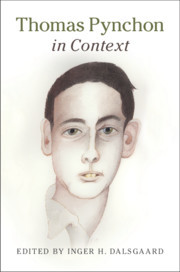Description
Thomas Pynchon in Context
Literature in Context Series
Coordinator: Dalsgaard Inger H.
This collection analyzes and explains the central contexts and themes relevant to Thomas Pynchon's fiction.
Language: English
Publication date: 06-2019
410 p. · 15.7x23.5 cm · Hardback
410 p. · 15.7x23.5 cm · Hardback
Description
/li>Contents
/li>Biography
/li>
Thomas Pynchon in Context guides students, scholars and other readers through the global scope and prolific imagination of Pynchon's challenging, canonical work, providing the most up-to-date and authoritative scholarly analyses of his writing. This book is divided into three parts. The first, 'Times and Places', sets out the history and geographical contexts both for the setting of Pynchon's novels and his own life. The second, 'Culture, Politics and Society', examines twenty important and recurring themes which most clearly define Pynchon's writing - ranging from ideas in philosophy and the sciences to humor and pop culture. The final part, 'Approaches and Readings', outlines and assesses ways to read and understand Pynchon. Consisting of Forty-four essays written by some of the world's leading scholars, this volume outlines the most important contexts for understanding Pynchon's writing and helps readers interpret and reference his literary work.
Chronology John M. Krafft; Introduction Inger H. Dalsgaard; Part I. Times and Places: 1. Biography John M. Krafft; 2. Letters, manuscripts and juvenilia Albert Rolls; 3. Nonfiction Katie Muth; 4. East Coast Christopher Leise; 5. West Coast Scott McClintock and John Miller; 6. Europe and Asia J. Paul Narkunas; 7. Africa and Latin America Michael Harris; 8. Geographies and mapping Sascha Pöhlmann; 9. Eighteenth century Elizabeth Jane Wall Hinds; 10. Nineteenth century Paolo Simonetti; 11. Twentieth century Steven Weisenburger; 12. Twenty-first century Celia Wallhead; 13. History and metahistory David Cowart; Part II. Culture, Politics and Society: 14. Family Mark W. Rohland; 15. Sex and gender Ali Chetwynd and Georgios Maragos; 16. Humor Doug Haynes; 17. Pop culture Eric Sandberg; 18. Music and sound Justin St Clair; 19. Film and TV John Dugdale; 20. Real estate and the Internet Inger H. Dalsgaard; 21. Politics and counterculture Joanna Freer; 22. Drugs and hippies Umberto Rossi; 23. Ecology and the environment Christopher K. Coffman; 24. Capitalism and class Jeffrey Severs; 25. War and power Dale Carter; 26. Conspiracy and paranoia Samuel Chase Coale; 27. Terror and anarchy James Gourley; 28. Science Gilles Chamerois; 29. Mathematics Nina Engelhardt; 30. Time and relativity Simon de Bourcier; 31. Philosophy Martin Paul Eve; 32. Religion and spirituality Richard Moss; 33. Death and afterlife Tiina Käkelä; Part III. Approaches and Readings: 34. Narratology Luc Herman; 35. Genre Zofia Kolbuszewska; 36. Postmodernism Brian McHale; 37. Ambiguity Deborah L. Madsen; 38. Realities Kathryn Hume; 39. Material readings Tore Rye Andersen; 40. Digital readings Joseph Tabbi; 41. Internet resources Michel Ryckx and Tim Ware; 42. Fans David Kipen; 43. Book reviews and reception Douglas Keesey; 44. Critical literature review Hanjo Berressem.
Inger H. Dalsgaard is Associate Professor in American Studies at the Department of English, Aarhus Universitet, Denmark. She is the author of numerous essays and articles on Thomas Pynchon and the co-editor, with Luc Herman and Brian McHale, of The Cambridge Companion to Thomas Pynchon (Cambridge, 2012).
© 2024 LAVOISIER S.A.S.
These books may interest you

The New Pynchon Studies 107.80 €




